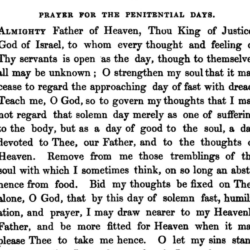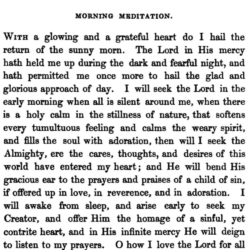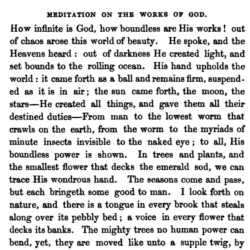TOGGLE COLUMNS (on/off):ADJUST COLUMN POSITIONS: select the column header cell and drag it where you want. show me!COPY INDIVIDUAL COLUMN(S): use CopyTables, a browser extension.
| Contribute a translation | Source (English) |
|---|---|
Meditation for the Penitential Days. | |
The day of atonement cometh, that day, when we believe an Almighty Father writes in his book of Judgment all those deserving of rewards and punishment! | |
How awful is that consideration; how doth it tell of the awful majesty, the unwavering justice of an Eternal God! And yet our earthly nature shrinks from the atonement we make for our past sins, the abstinence from all food for five and twenty hours, with far greater dread than from the thought of the awful judgment perchance pronounced upon us; we devote days to pleasure, to enjoyment, and can we grudge one single day out of the 365, devoted to the service of the Almighty. | |
It is not only a day of mortification and of prayer; we should do but little good to our souls if we look not into ourselves with a stern unshrinking eye, and probe into the inmost recesses of our hearts, which Jeremiah saith “is deceitful above all things,” (Jeremiah 17:9) and fear not the pain it inflicts, but calmly, steadily, unshrinkingly behold our many sins and faults. We cannot repent for our sins if we know them not; we cannot amend our faults if they are hidden from our own eyes; we may confess that we have sinned, but our confessions will do us but little good, if we know not what those sins are. | |
On each of the ten days that precede that awful day of atonement, morning and evening should we look into our souls with greater strictness than we have ever done before, and with the help of the Almighty, ere the solemn day arrives, our multitude of sins and faults will take a distinct form before us, and however we may shrink from so mortifying a view of ourselves, our prayers on the day of atonement will be more acceptable in the sight of that Almighty Being who is to judge us, and more beneficial to ourselves. Then, then may we break our fast with rejoicing and delight; then when we have seen our sins and know them, and have promised in our minds to amend them, and try by the next year to have fewer sins for which to atone, then may we feel our prayers have been heard and are acceptable to God, and all may then obey the word— “Go thy way and eat thy bread and drink thy wine with a merry heart, for the Lord thy God hath accepted of thy works.” (Ecclesiastes 9:7) How, then can I subdue the tremblings of my soul, as this day approacheth nearer and nearer— by prayer, by fervent and humble prayer. | |
I will pray to my God for strength to regard this solemn day, not as a day of fast and pain to the body, but as a day devoted to Himself, when not even the yearnings of our nature can interrupt our prayers to Him; and if He in His mercy will hearken to my prayers and pour His spirit on my soul, my spirit will not fail, the cravings of nature will be as naught, and my soul will glow in joy and love and adoration. | |
I will go to Him to point out my sins that I may know them, that my repentance may be sincere, my amendment visible; thus, will I regard this solemn day, and with the Almighty’s grace, I shall obtain strength to regard it not with dread and trembling, but as a day devoted to Himself and to repentance. | |
Praised be His Holy Name! |
“Meditation for the Penitential Days” by Grace Aguilar was published posthumously by her mother Sarah Aguilar in the UK edition of Sacred Communings, pp. 88-90. It is not found in the US edition.
Source(s)


“Meditation for the Penitential Days, by Grace Aguilar (ca. 1830s)” is shared through the Open Siddur Project with a Creative Commons Public Domain Dedication 1.0 Universal license.










Comments, Corrections, and Queries